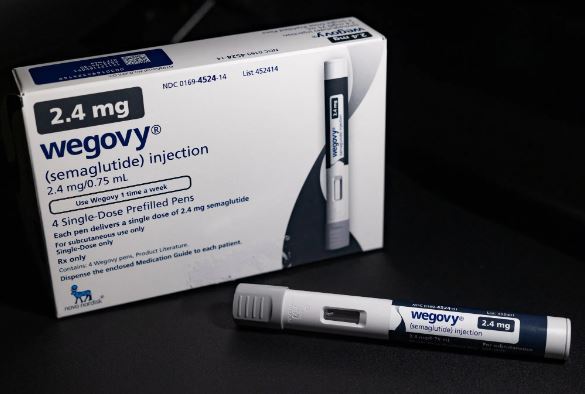Researchers have reported that individuals taking the popular drugs Ozempic and Wegovy, used to treat diabetes and combat obesity, may be slightly less likely to experience suicidal thoughts compared to those not taking these medications. The study, published in the journal Nature Medicine and funded by the National Institutes of Health, utilized electronic health records from a database of 100.8 million people, making it one of the most extensive investigations on the subject. The findings may offer some reassurance to the millions of people worldwide who rely on these medications.
Ozempic and Wegovy, developed by Novo Nordisk, are considered blockbuster drugs in medical history, with millions of individuals benefiting from their use. However, concerns about a potential link to suicidal thoughts led to an investigation by a European drug safety agency last year. The new study, independent of Novo Nordisk’s involvement, aimed to provide valuable data on the safety profile of these medications.
The researchers examined anonymized health records from the vast database, focusing on two groups: 240,618 individuals prescribed Wegovy or other weight loss drugs and 1,589,855 individuals prescribed Ozempic or other blood sugar-lowering medications. The study included routine monitoring of patients’ health records for suicidal thoughts.
Comparing the incidence of suicidal thoughts between those taking the drugs and similar individuals not on these medications but using other weight loss and anti-diabetes drugs, the researchers found no increased risk. The study also investigated the recurrence of suicidal thoughts among those taking the drugs who had previously reported such thoughts. The extensive database allowed for subgroup analyses based on factors such as sex, race, and age.
Rong Xu, director of the Center for Artificial Intelligence in Drug Discovery at Case Western Reserve University, emphasized that, despite thorough efforts, the study could only establish associations and not causation. Nora D. Volkow, director of the National Institute on Drug Abuse, echoed the sentiment, underscoring the need for further studies to draw more definitive conclusions.
While the study offers insights into the potential association between Ozempic, Wegovy, and suicidal thoughts, it is essential to recognize the limitations of observational studies. The researchers acknowledged the need for continued research to delve deeper into this aspect of drug safety.
The investigation was prompted by the European Medicines Agency’s committee announcement in July, stating it was examining reports from Iceland regarding suicidal thoughts associated with Ozempic and Wegovy. However, the study’s authors highlighted the challenges of interpreting anecdotal reports, emphasizing the complexity of establishing a direct link between the drugs and suicidal thoughts.
The European agency acknowledged the limitations of its case reports and issued new questions to be addressed by the companies. A meeting scheduled for April will address the ongoing investigation.
The U.S. Food and Drug Administration (FDA) remains vigilant in monitoring the drugs but maintains that the benefits of Ozempic and Wegovy outweigh their risks when used according to approved labeling. Novo Nordisk, the maker of the drugs, welcomed the study’s findings, emphasizing the alignment with safety data from large clinical trial programs and post-marketing surveillance.
In addition to investigating suicidal thoughts, the research group led by Dr. Xu and Dr. Volkow has completed another study using the same extensive database. This study explores whether Ozempic and Wegovy reduce cravings for cigarettes and alcohol. While awaiting peer review, the researchers found anecdotal reports to be accurate, indicating that individuals taking the drugs reported less interest in smoking and drinking.
The study contributes to the ongoing dialogue about the safety profile of Ozempic and Wegovy, adding valuable data to the understanding of these widely prescribed medications. As further research emerges, individuals and healthcare providers can make more informed decisions about the benefits and potential risks associated with these drugs.

